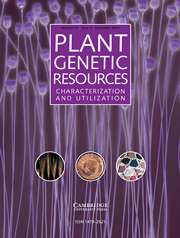Article contents
Analysis of high-molecular-weight glutenin subunits in five amphidiploids and their parental diploid species Aegilops umbellulata and Aegilops uniaristata
Published online by Cambridge University Press: 16 June 2014
Abstract
Amphidiploids serve as a bridge for transferring genes from wild species into wheat. In this study, five amphidiploids with AABBUU and AABBNN genomes were produced by spontaneous chromosome doubling of unreduced triploid F1 gametes from crosses between diploid Aegilops (A. umbellulata accessions CIae 29 and PI 226500, and A. uniaristata accession PI 554419) and tetraploid Triticum turgidum (ssp. durum cultivar Langdon and ssp. dicoccum accessions PI 94 668 and PI 349045) species. The composition of high-molecular-weight glutenin subunits (HMW-GS) in these amphidiploids and in their parental A. umbellulata and A. uniaristata species was analysed. As expected, the amphidiploids from T. turgidum ssp. dicoccum accession PI 944668 or PI 349045 and A. umbellulata accession CIae 29 or PI 226500 and A. uniaristata accession PI 554419 showed the same HMW-GS patterns as those of their Aegilops parents, because HMW-GS genes were all silenced in the T. turgidum ssp. dicoccum parents. The amphidiploids from CIae 29 and Langdon inherited all of the HMW-GS genes from their parents except for the Uy type. Using 10 and 15% sodium dodecyl sulphate–polyacrylamide gel electrophoresis (SDS–PAGE) and 10% urea/SDS–PAGE, 11 Ux and ten Uy types in 16 combinations were observed in 48 A. umbellulata accessions, and two Nx and two Ny types in two combinations were detected in six A. uniaristata accessions. These novel HMW-GS variants may provide new genetic resources for improving the quality of wheat.
Keywords
- Type
- Short Communication
- Information
- Copyright
- Copyright © NIAB 2014
References
- 11
- Cited by


